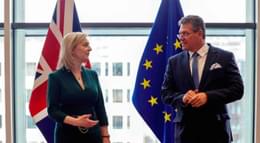
Brexit: a fantastic hope for France
Despite their historic rivalry, Dimitri de Vismes, delegate for the French UPR party in the UK believes Brexit poses great opportunities for both the UK and France.
In France, opinions regarding the EU can be divided into two:
The Pro-EU position, which can either be: the EU functions fairly well and should be further developed, or the EU principles are good but some aspects should be changed. This latest position is called euro-critical or euro-reformist.
The position that rejects the principle of belonging to the EU and wants the country to leave it.
The Pro-EU position is largely spread in the French mainstream media – overall owned by a dozen of private interests or individuals – while the latter is barely exposed and its supporters have very little opportunities to debate with the Pro-EU people. Most often, when such an opportunity arises, this position is minimised or not considered seriously.
By voting in favour of Brexit on 23rd June 2016, the people of the UK gave a new hope to all the French who reject the principles of the EU and more generally those who voted "No" to the European Constitution with a large majority of 54.7% in 2005. By deciding to leave the EU through a referendum, the people of the UK have perpetuated their long tradition of respect for people's freedom, democracy and sovereignty. Fully in line with the spirit of the highly innovative Magna Carta 800 years ago establishing limitations of the government's powers by law and setting up the basics for individual liberties, the UK is once again leading the way in Europe by democratically choosing to leave a technocratic institution that disregards the interests and opinions of the People it administers – namely the EU.
In France, one political party follows this situation with the greatest interest. Founded 25th March 2007 – the 50th Anniversary of the signature of the Treaty of Rome – by a French politician, François Asselineau (former candidate for the French Presidential election in 2017), the UPR (Union Populaire Républicaine; Popular Republican Union) has steadily developed and became one of the biggest French political parties in 2018. This party aims at withdrawing France from the EU (Frexit), from the Eurozone (abandoning the Euro currency) and from NATO. For the past 10 years, the UPR has held hundreds of conferences on EU topics – generally very detailed – across the country, trying to educate people on the true nature of the EU and why it urges so much to leave this supra-national structure. With nearly 32,000 members (as of the beginning of September 2018), the UPR is almost absent from the French media coverage despite having the most attractive political website of France (according to Alexa Ranking for Internet traffic).
After more than 60 years of existence, the EU has clearly demonstrated the lack of democracy of its institutions.
The Treaty of Lisbon entered into force in 2009 – which was initially rejected (referendums in 2005) by the French and the Dutch voters in its original shape, the "European Constitution" – sets the EU full competency (full power) in a number of strategic domains such as competition rules or customs union. It also gives to the EU a shared competency (large power) in other key domains such as environment, energy or research. In addition to the laws (regulations and directives) directly applicable for all member States, bespoke orientations – set in yearly reports named Council Recommendations – are directed to each member state. In the early 2000's the German advisor Klaus Regling has been a key decider for the policies to the French government.
Despite being not elected by the so-called "European People", the twenty-eight European Commissioners hold both legislative and executive powers, unlike the fundamental principle of the "Separation of Powers System" recommended by Montesquieu during the 18th century, and which is applied in a number of European countries where the government stands for the executive power and the parliament for the legislative one.
Between 1995 and 2007 the EU went from twelve to twenty-seven member states, thus becoming a huge bureaucratic machine with more than twenty official languages. Most of the states who recently joined the EU were from Eastern Europe, where the economic conditions were obviously lower than in several western states. However, the People from the original member States were never given a choice over this enlargement.
Besides the power confiscation by a non-elected oligarchy, the European Union leans on various European treaties, which cannot benefit all member States. The main reason for this is that the twenty-eight member States have not the same interests in the EU. They also have different historical – and sometimes, contradictory – ties with third countries (non-EU countries), making EU diplomacy inefficient. Whereas some countries would like to escape from the Russian sphere of influence (Eastern European countries for the most), some others would certainly benefit from a closer co-operation with Russia. France is one of them.
Chained into a complex network of divergent interests, the member states of the European Union must accept the rules of a game for which no one can win. By prohibiting any restriction on the movement of capital, Article 63 of the Treaty on the Functioning of the EU (TFEU) puts all the EU workers and fiscal systems in competition with one another and with third countries. As companies can transfer their funds without any control from the state, they build factories in countries with the least costs and regulatory constraints, heavily contributing to unemployment and the deindustrialisation. In France about one factory shuts down every day because of the direct effects of Article 63. As a result, the unemployment rate is extremely high: close to 10% of the active population in the beginning of 2018.
The cost of the EU for states that are net contributors to the EU budget – UK and France are net contributors – is also very important. For France it is deemed around 23 billion Euros per year. The direct cost for the UK would be of a similar order. This money is a direct expenditure from the state and can only be partially recovered through various funds or programs decided by the EU: France recovers about 14 billion Euros per year. In any case, the member state does not have the final decision on how and where to spend the money. The rest of the state's contribution – about 9 billion Euros per year for France – is being redistributed amongst the net beneficiary member states of the EU (i.e. poorer States) and other countries not members of the EU such as Turkey and Ukraine.
As regularly illustrated by the increasing abstention rate at each new European Parliament election, the People of Europe do not believe in the EU anymore. In parallel, both Brexit and the recent rise of "populist" movements are a sign of a general discontent with the policies applied in EU states.
The Brexit referendum is a fantastic hope for the all the people of Europe who fight to restore their lost democracy and sovereignty. It also proves that getting out of the EU is not an extremist idea – as opposed to what is very often stated in the French media – but more importantly, this is a real option through the activation of Article 50 of the Maastricht Treaty. Brexit is also a great demonstration that people's voices shall always prevail over any other form of illegitimate authority. By getting rid of the EU confinement, the member states will decide their future again and will start forging new international bonds for the greater benefit of the world. It will also promote the plurality and the diversity of opinions and bring more peaceful and fairer relationships between countries.
Not only will Brexit benefit the United Kingdom, but it will also show to the other states that a better life is possible outside of the EU. This idea already started to emerge in France, where for the first time we can hear some debates about the EU belonging.
Long live the British People, and long live Brexit!
This article is from an anthology of essays shortly to be published on www.theredcell.co.uk.








